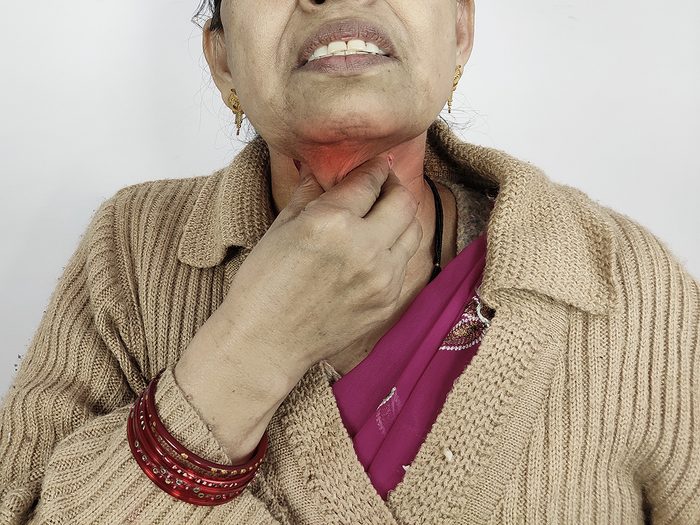
What’s Wrong With Me?
The patient: Sushma (real name has been changed), a 51-year-old community volunteer
The symptoms: A weakened voice
The doctor: Dr. Avinash Chandra, a neurologist at the Annapurna Neurological Institute and Allied Sciences in Kathmandu, Nepal
Sushma lived with her husband and teenage daughter in a rural Nepali town, where she kept a busy schedule organizing festivals and singing in a choir. At 51, she’d never had any serious health concerns.
In the late summer of 2019, Sushma noticed a change in her voice. Over the course of each day, it would gradually become weak and hoarse. She didn’t have any pain, and her voice was back to normal when she woke up each morning. But after several days of experiencing the same problem, she decided to see a doctor.
Family physicians are uncommon in much of Nepal. When patients have a health issue, they choose a specialist, depending on what they think is wrong. Since Sushma thought she might have a throat infection, she consulted an ear, nose and throat doctor (ENT). He agreed that Sushma’s symptoms could be caused by an infection or allergies, so he prescribed antibiotics and allergy pills.
Yet Sushma’s voice weakened even further over the next few days. Her family members strained to make out what she was saying. She started worrying that the cause might be something serious. What if she could no longer speak at community gatherings, or sing? An anxious Sushma returned to the clinic and asked for a different ENT.
This doctor recommended a laryngoscopy, in which a thin tube with a camera is inserted down the throat, to check whether any abnormal growths were interfering with Sushma’s vocal-cord function. The test was only available in Kathmandu, 400 kilometres away, where, fortunately, Sushma and her family had a relative they could stay with. So, 12 days after her voice weakness began, they made the long trip by bus.

The Diagnosis: Following a Hunch
There, an ENT performed the laryngoscopy but couldn’t see anything out of the ordinary. He theorized that she could have some paralysis of the nerve controlling the vocal cords. For that kind of problem, however, she’d need to be evaluated by a neurologist.
Two days later, Sushma went to see Dr. Avinash Chandra at the Annapurna Neurological Institute and Allied Sciences. “When Sushma first spoke to me, it was in a very low voice,” Chandra recalls. “I asked her, ‘Can you speak loudly?’ And her daughter told me: ‘No, doctor, this is the problem!’”
Chandra discounted nerve paralysis because Sushma’s voice fluctuated from morning to night; he thought she probably had a more widespread neurological problem. Since there were no other symptoms, it was challenging to narrow it down, but he suspected Parkinson’s disease. It’s more common than most other degenerative nervous system diseases; it develops around middle age; and it can cause the voice to become quieter.
“Sushma’s main concern was that she could lose her voice forever,” says Chandra. “I told her we had medicine that may help, but she worried about the progressiveness of the disease.”
Two other possibilities were amyotrophic lateral sclerosis (ALS), a gradual breakdown of the neurons that control movement, and myasthenia gravis (MG), an autoimmune disease in which abnormal antibodies attack the part of the muscle that receives nerve signals. The latter can affect arm and leg muscles, but in about 15 per cent of cases, it starts with weakness in the face and throat. Both are rarer than Parkinson’s, and voice weakness wouldn’t normally be their only symptom, but Sushma’s grandfather had experienced unexplained muscle and breathing difficulties before he died, so there could be ALS in the family.
Chandra ran tests, including a brain MRI, but everything looked normal—no sign of the lesions associated with ALS. “I was still thinking Parkinson’s,” he says.
While there’s no single diagnostic test for Parkinson’s, there is an antibody test to rule out MG. Results can take 10 days or more, however, since Sushma’s blood samples would have to be sent to India for analysis. “Having to wait for the report is quite devastating for the patient,” says Chandra. He has often witnessed first-hand the anguish caused by such a delay.
He ordered the test but also took another step to get answers faster. “In Nepal, we do things differently from other countries because we don’t have the same resources,” Chandra explains.
The government underfunds health care in the country, and the limited access to medical technology can have dire consequences; many treatable conditions are among the top causes of death. “Sometimes we try out the medicine for a disease,” says Chandra. “This is not a very evidence-based practice, but if it has the desired effect, it supports the diagnosis.”

A Rare Disorder Revealed
The next afternoon, he gave Sushma one shot of neostigmine, a drug used in MG treatment, and instructed her to wait an hour in his hospital’s ER, where she could be monitored in case of severe adverse effects.
Within 30 minutes, her daughter came running, calling out for the doctor. Her mother’s voice had suddenly improved. MG is an extremely rare disorder, affecting only about four in 10,000 people. But if Sushma had had Parkinson’s, her voice wouldn’t have responded to the medication.
Now Sushma had a likely answer. “I was happy she got a diagnosis, which many other doctors had failed to give her. But I was happy for another reason, too,” says Chandra. “The medicine for Parkinson’s costs a lot in this country.” Myasthenia gravis medication is more affordable.
Sushma started regular treatment after the antibody test came back positive. Her voice improved within a week, and her extended family was thrilled with Chandra’s work. “They brought other family members suffering from all kinds of other diseases, telling me, ‘You are a good doctor!’” he chuckles. “With such a rare presentation, I’m very happy that I was able to diagnose Sushma.”
Next, read about a teen whose vision loss was a mystery—until a doctor asked him what he ate.